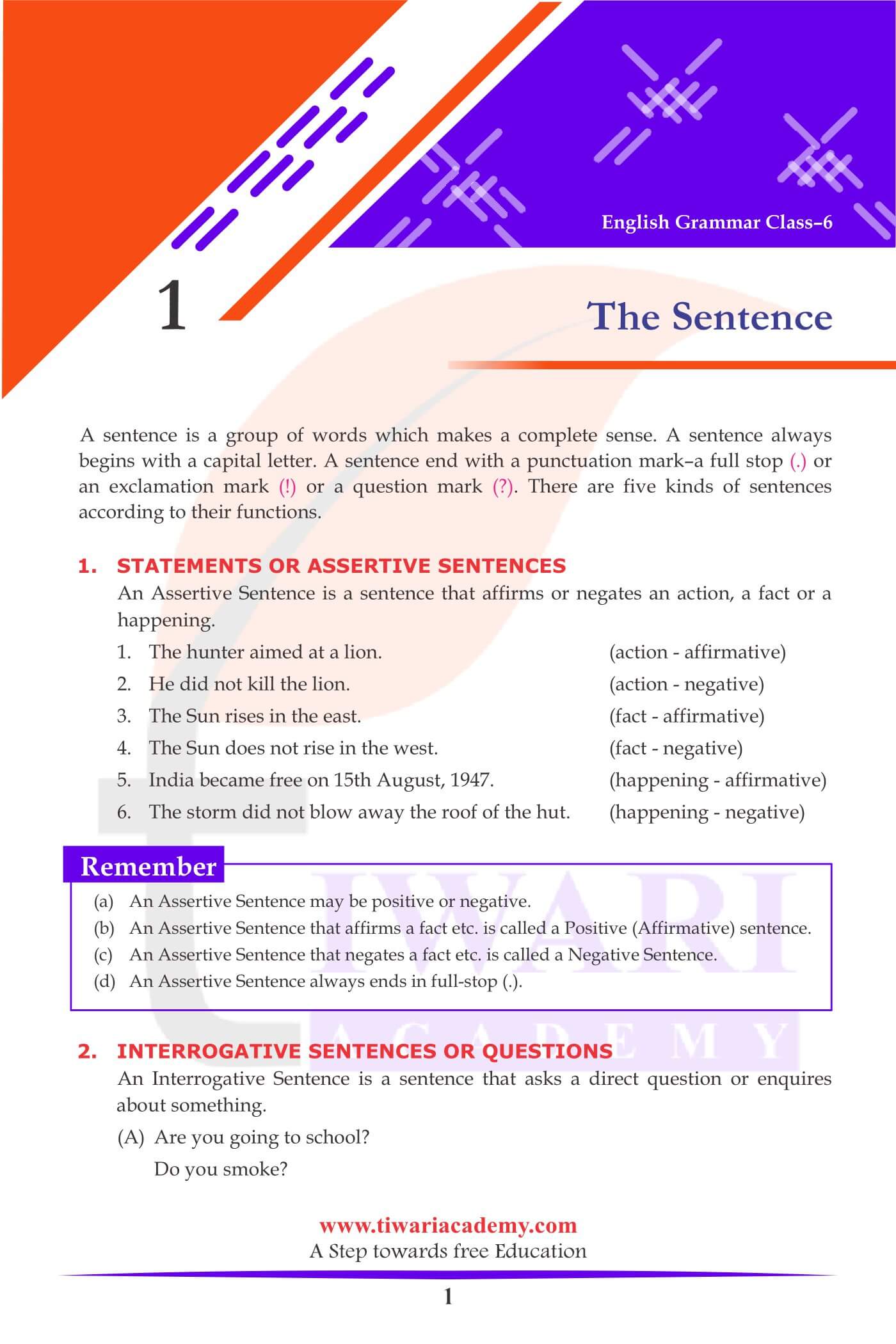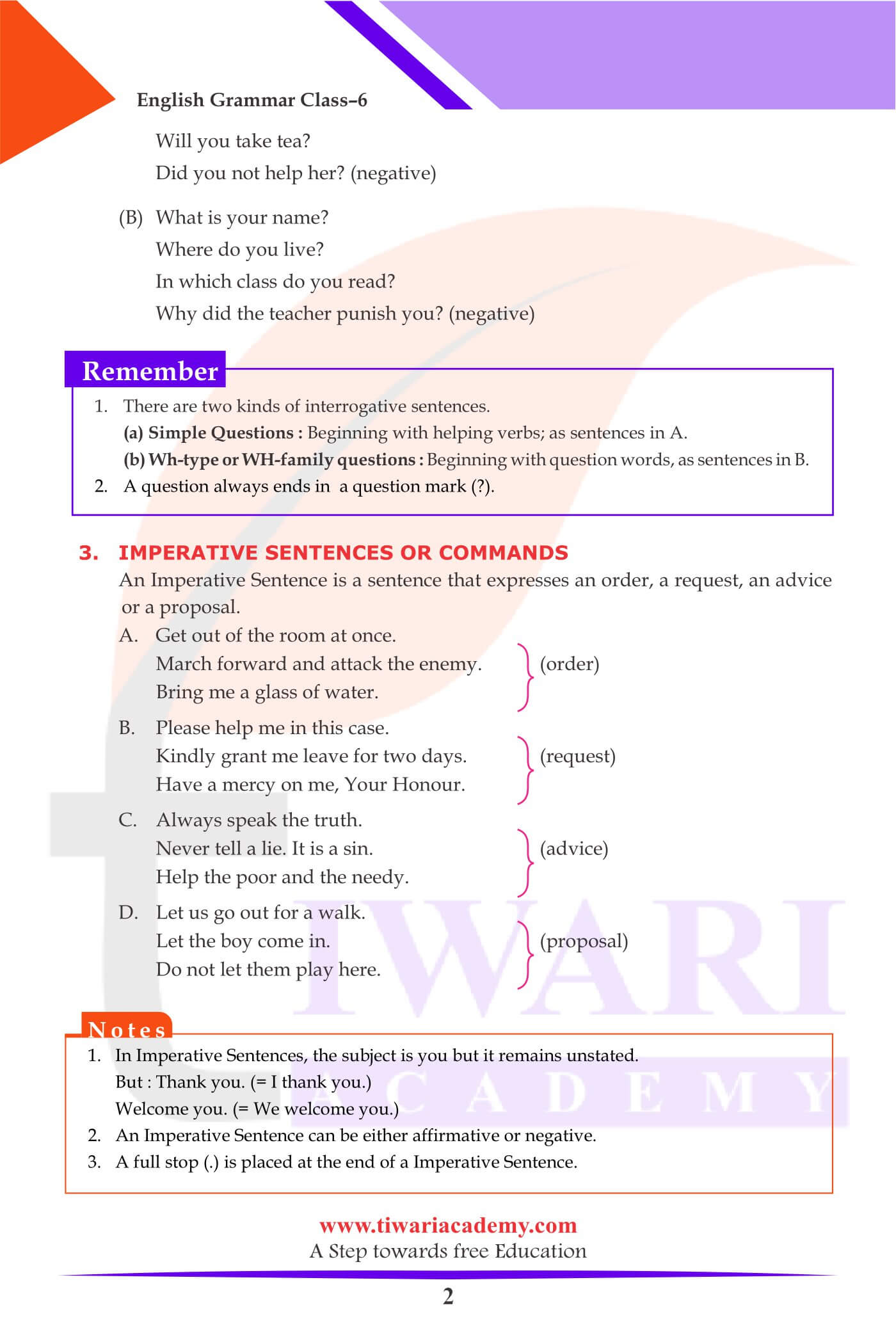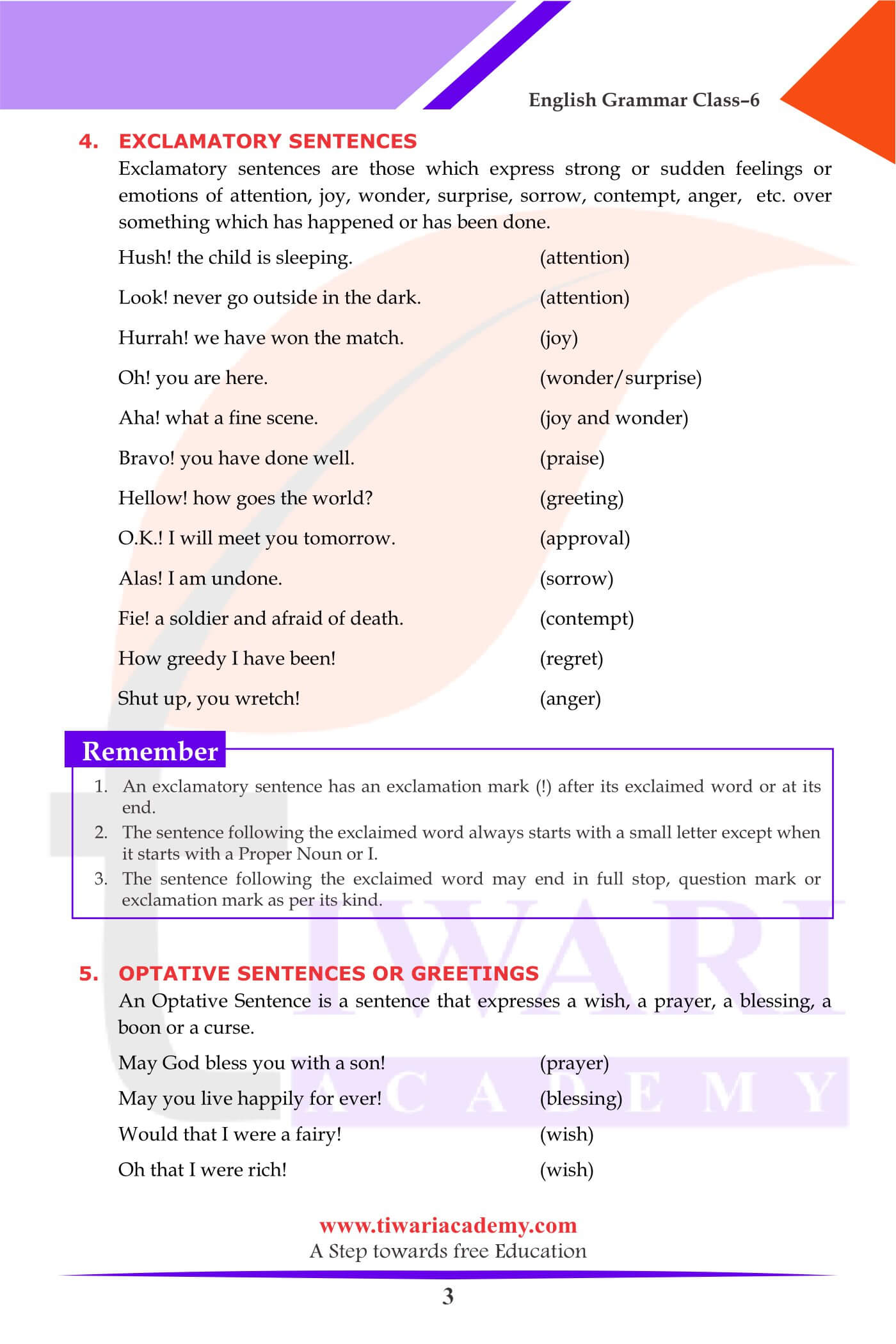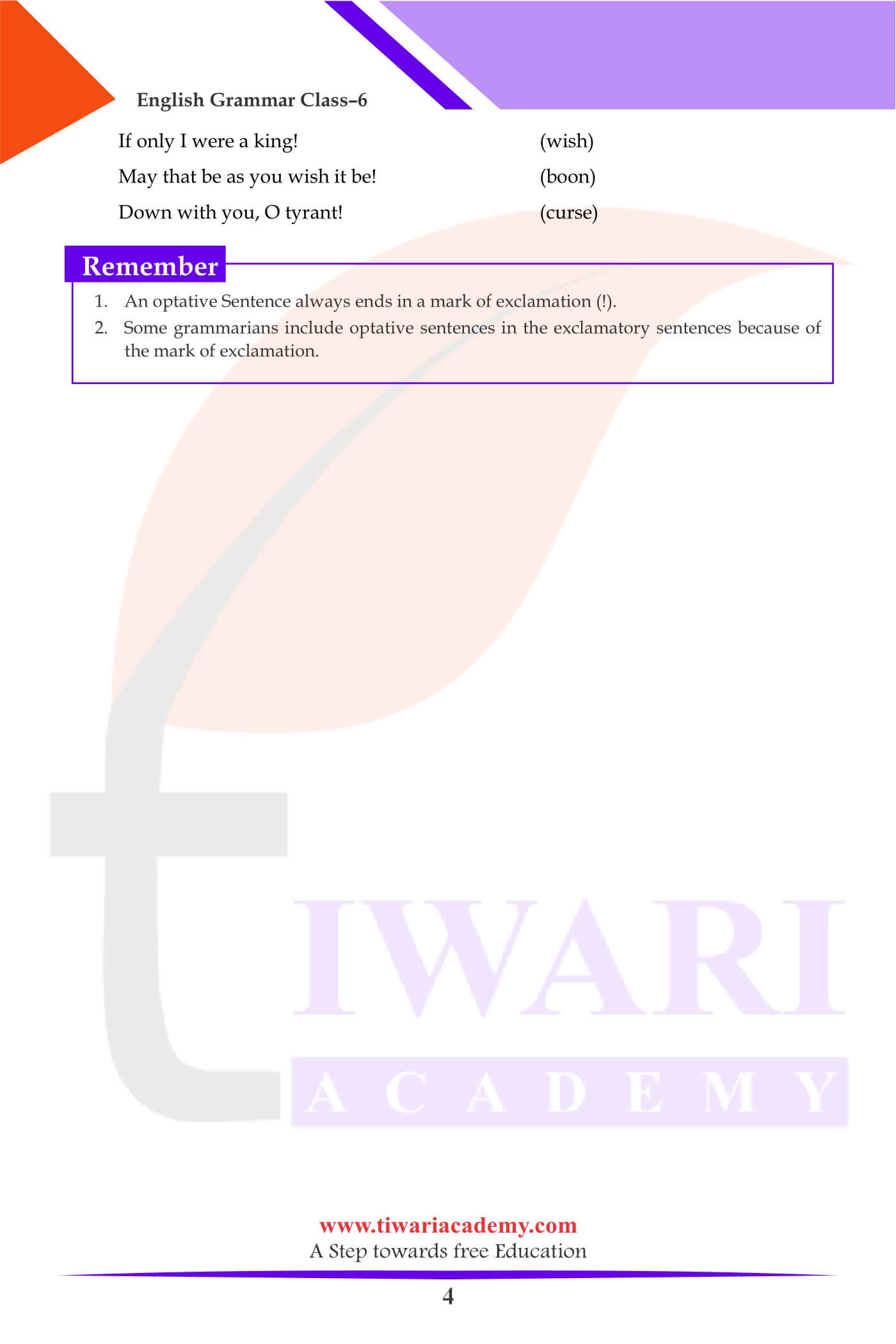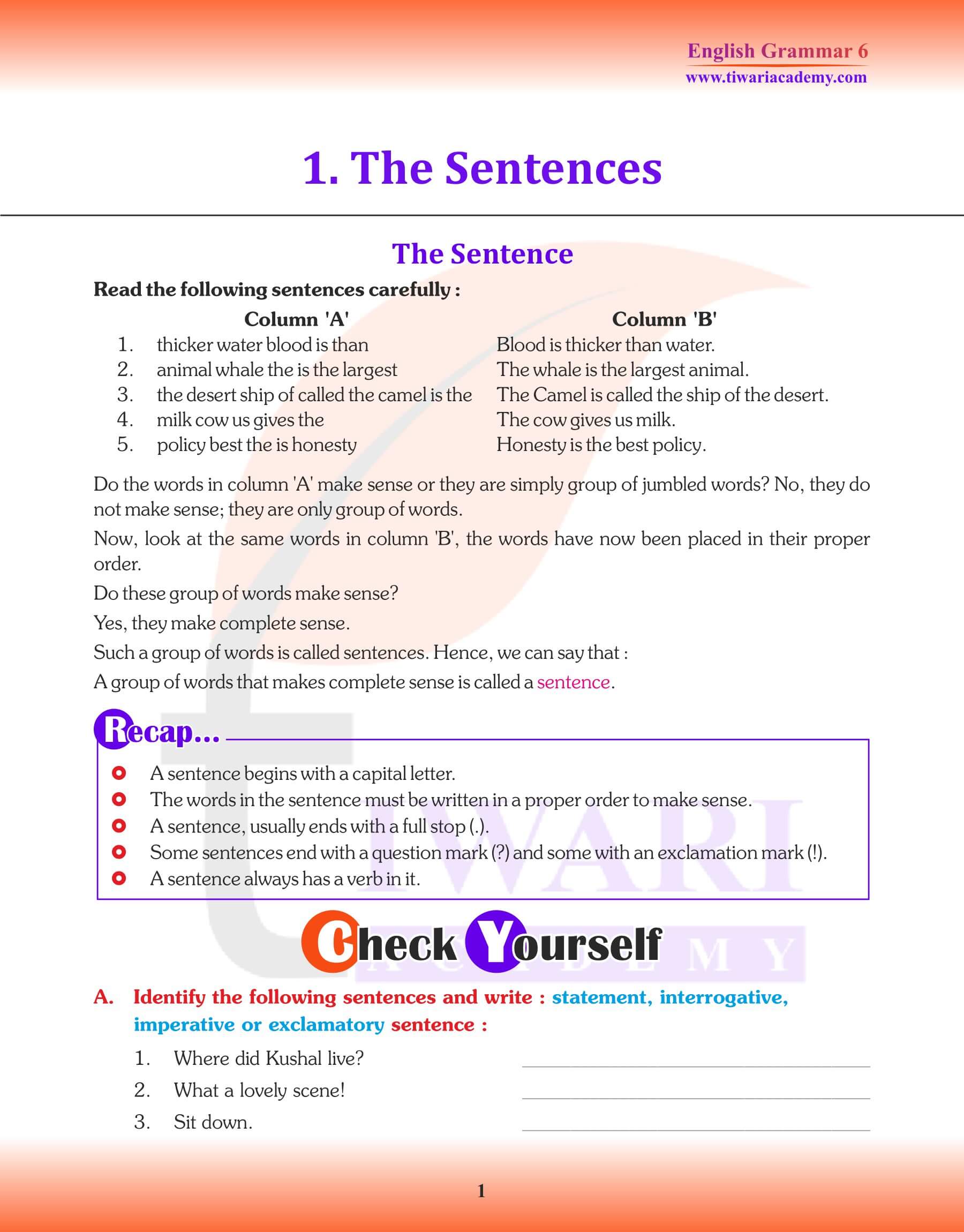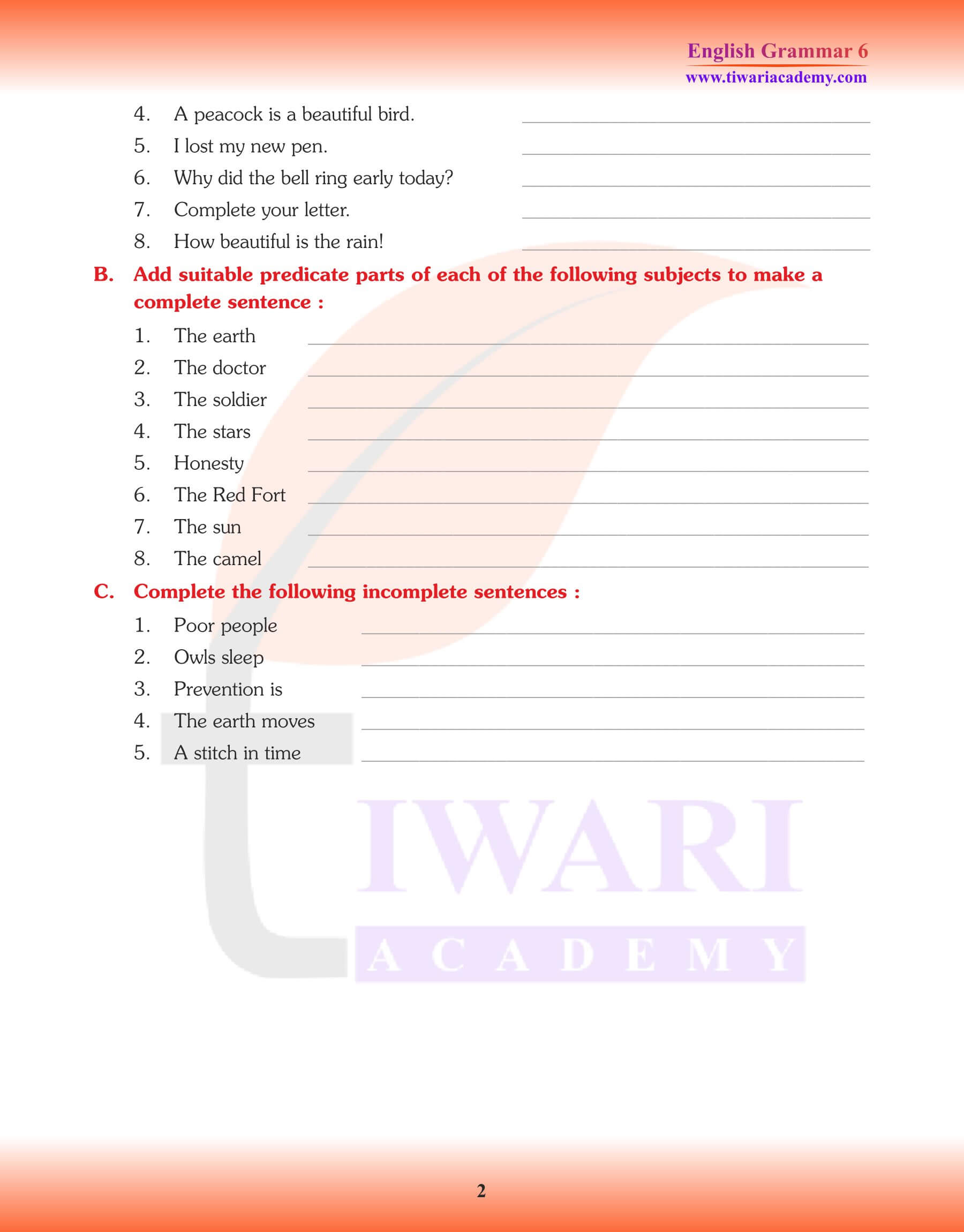Class 6 English Grammar Chapter 1: A sentence, which is a group of words which makes a complete sense. A sentence always begins with a capital letter. A sentence end with a punctuation mark–a full stop (.) or an exclamation mark (!) or a question mark (?). There are five kinds of sentences according to their functions. We will discuss here all five kind with examples.
Class 6 English Grammar Chapter 1: A Sentence to Study Online
Understanding Sentence Basics in English Grammar
A sentence, in class 6 English grammar, is a cohesive unit of words that conveys a clear and complete thought. Just like building blocks, each word in a sentence contributes to its overall meaning. To easily recognize a sentence when reading, there are certain visual cues to look out for. Every genuine sentence begins with a capital letter, signifying its commencement. The end of a sentence is demarcated by a punctuation mark. These marks, which include a full stop (.), exclamation mark (!), or question mark (?), provide insight into the nature and tone of the sentence.
| Class: 6 | English Grammar |
| Chapter 1: | A sentence |
| Content: | Textbook and Revision Notes |
| Academic Session: | 2024-25 |
6th English Grammar: Sentence and its Kinds
Assertive Sentence
An Assertive Sentence is a sentence that affirms or negates an action, a fact or a happening.
- (a) An Assertive Sentence may be positive or negative.
- (b) An Assertive Sentence that affirms a fact etc. is called a Positive (Affirmative) sentence.
- (c) An Assertive Sentence that negates a fact etc. is called a Negative Sentence.
- (d) An Assertive Sentence always ends in full-stop (.).
Class 6 English Grammar Chapter 1 Explanation
Different Kinds of Sentences in English
Delving deeper into the realm of sentences, one discovers that they are not monolithic. There are diverse kinds of sentences, each serving a unique function. Essentially, there are five distinct types based on their purpose or the reaction they seek to elicit from the reader. These categories help in structuring the information and guide the reader through the nuances of the message being conveyed. Just as colors have shades, sentences have varieties that add depth and dimension to our communication.
Interrogative Sentence
An Interrogative Sentence is a sentence that asks a direct question or enquires about something.
- There are two kinds of interrogative sentences.
(a) Simple Questions : Beginning with helping verbs; as sentences in A.
(b) Wh-type or WH-family questions : Beginning with question words, as sentences in B. - A question always ends in a question mark (?).
Imperative Sentence
An Imperative Sentence is a sentence that expresses an order, a request, an advice or a proposal.
- In Imperative Sentences, the subject is you but it remains unstated.
But : Thank you. (= I thank you.)
Welcome you. (= We welcome you.) - An Imperative Sentence can be either affirmative or negative.
- A full stop (.) is placed at the end of a Imperative Sentence.
Exclamatory sentences
Exclamatory sentences are those which express strong or sudden feelings or emotions of attention, joy, wonder, surprise, sorrow, contempt, anger, etc. over something which has happened or has been done.
- An exclamatory sentence has an exclamation mark (!) after its exclaimed word or at its end.
- The sentence following the exclaimed word always starts with a small letter except when it starts with a Proper Noun or I.
- The sentence following the exclaimed word may end in full stop, question mark or exclamation mark as per its kind.
Examples and Classification of Sentences
To fully grasp the concept of sentence types, examples are instrumental. For instance, a declarative sentence like “The sky is blue” provides information. An interrogative sentence, like “Is the sky blue?”, seeks an answer. Then we have imperative sentences which give commands, such as “Close the door”. Exclamatory sentences, like “What a beautiful sunset!”, express strong emotion. Finally, optative sentences express a wish, for example, “May you have a long life”. By understanding and identifying these classifications, readers can enhance their comprehension and writers can craft impactful messages tailored to their audience’s needs.
Optative Sentence
An Optative Sentence is a sentence that expresses a wish, a prayer, a blessing, a boon or a curse. For Example: May God bless you with a son! (prayer).
- An optative Sentence always ends in a mark of exclamation (!).
- Some grammarians include optative sentences in the exclamatory sentences because of
the mark of exclamation.
Class 6 English Grammar Chapter 1 Extra Questions
What is an Assertive Sentence?
An Assertive Sentence is a sentence that affirms or negates an action, a fact or a happening.
For Example:
1. The hunter aimed at a lion. (action – affirmative)
2. He did not kill the lion. (action – negative)
3. The Sun rises in the east. (fact – affirmative)
4. The Sun does not rise in the west. (fact – negative)
5. India became free on 15th August, 1947. (happening – affirmative)
6. The storm did not blow away the roof of the hut. (happening – negative)
What is an Interrogative Sentence?
An Interrogative Sentence is a sentence that asks a direct question or enquires about something.
For Example:
1. What is your name?
2. Where do you live?
3. In which class do you read?
4. Why did the teacher punish you? (negative)
What is an Imperative Sentence?
An Imperative Sentence is a sentence that expresses an order, a request, an advice or a proposal.
For Example:
1. Get out of the room at once. (order)
2. March forward and attack the enemy. (order)
3. Bring me a glass of water. (order)
4. Please help me in this case. (request)
5. Kindly grant me leave for two days. (request)
6. Have a mercy on me, Your Honour. (request)
7. Always speak the truth. (advice)
8. Never tell a lie. It is a sin. (advice)
9. Help the poor and the needy. (advice)
What are Exclamatory sentences?
Exclamatory sentences are those which express strong or sudden feelings or emotions of attention, joy, wonder, surprise, sorrow, contempt, anger, etc. over something which has happened or has been done.
For Example:
1. Hush! the child is sleeping. (attention)
2. Look! never go outside in the dark. (attention)
3. Hurrah! we have won the match. (joy)
4. Oh! you are here. (wonder/surprise)
5. Aha! what a fine scene. (joy and wonder)
6. Bravo! you have done well. (praise)
7. Hellow! how goes the world? (greeting)
Feedback and Suggestions
We are here to help you in educational problems. Ask your doubts related to CBSE Board and share your knowledge with your friends and other users through Discussion Forum. Download CBSE NCERT Books and Apps for offline use for academic session 2024-25.
